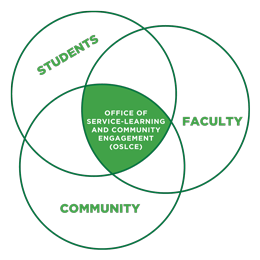Empowering students to become lifelong leaders

If you are a community partner looking for USC Upstate students to either volunteer or a service-learning class to assist you with an identified community need.
At USC Upstate we seek to provide transformative experiences, and to advance social and economic mobility throughout the region as we empower students to become lifelong leaders. The Office of Service Learning and Community Engagement seeks to contribute to these efforts through supporting students, faculty, and staff in their involvement with our community – with primary focus on curricular activities and faculty development.
Service Learning and Community Engagement (SL/CE, pronounced “slice”) has manifested differently in educational institutions internationally since the 20th century. At USC Upstate, we define service learning as teaching and learning that blends service with credit-bearing courses, derives from a need in the community, defined by a community partner, founded on disciplinary content, and incorporating deep reflection. We define community engagement as collaboration with our larger community (local, regional/state, national, global) for the mutually beneficial exchange of knowledge and resources to address critical community issues in a context of partnership and reciprocity.
Together, SL/CE at USC Upstate seeks to enrich scholarship, research and creative activity; enhance curriculum, teaching and learning; prepare educated, engaged citizens; strengthen democratic values and civic responsibility; address critical societal issues; and contribute to the public good.
The Office of Service Learning and Community Engagement (OSLCE) was established in 2015 as a forum that cultivates strong reciprocal relationships between USC Upstate faculty, students and community organizations. For community partners, the OSLCE recruits and prepares students to participate in meaningful service-oriented activities. For students, the OSLCE provides information about service-learning courses and creates opportunities to engage the community through service-based organizations such as IMPACT and Alternative Break. For instructors, the OSLCE builds individualized connections to viable community partners for service-learning course placements and offers learning opportunities in course development and implementation.
Click on plus button at the bottom of this Accordion BLOCK (not accordion tab) to create a new tab. Select Accordion TAB block to edit tab headline. Select nested blocks within accordion tab to edit content.
-
Service learning at USC Upstate is defined as a method of teaching and learning that integrates student participation in organized service activities into credit-bearing courses. By collaboratively addressing identified community needs with a community partner, the service experience enhances student learning by providing an opportunity to observe, test and apply discipline-based theories, concepts and skills. The academic context enriches the service experience by raising questions about real world issues and by providing a forum to reflect upon them. Further, service-learning is a mechanism to achieve a broader appreciation of the discipline, to sharpen problem solving skills and to develop an enhanced sense of civic responsibility (Approved by Faculty Senate, 02/20/2015)
For more information about Service Learning at USC Upstate, please email ServiceLearning@uscupstate.edu.
Click on plus button at the bottom of this Accordion BLOCK (not accordion tab) to create a new tab. Select Accordion TAB block to edit tab headline. Select nested blocks within accordion tab to edit content.
-
Community Engagement is described as the collaborative relationship between institutions of higher education and their broader communities (local, regional/state, national, global) for the mutually beneficial exchange of knowledge and resources, in a context of partnership and reciprocity.
The University’s metropolitan mission rests upon a foundation of partnerships with the education, corporate, and service organizations of the Upstate, through which our students gain extensive experiential learning opportunities.
Opportunities to learn and serve together reflect the University’s aim to prepare its students to participate as responsible citizens in a diverse, global and knowledge-based society, to pursue excellence in their chosen careers and to continue learning throughout life. Click here to view an overview of types of engagement we envision.
The University recognizes that promoting civic engagement by its faculty, staff, and students strengthens the fabric of the community we serve, while enriching faculty scholarship and the student learning experience beyond the classroom. We welcome you to explore service-learning and community engagement at USC Upstate.
For more information about Community Engagement, please email ServiceLearning@uscupstate.edu or call an OSLCE representative at 864-503-5106.
Additional Resources
- USC Upstate Collaboratory: A map and searchable list of Community Engagement and Public Service Activities.
- Engage Upstate Blog: A blog about all things Service Learning & Community Engagement on campus.
